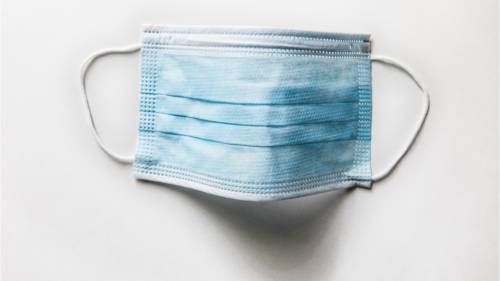The Musar of masks
08/03/2020 12:34:36 PM
Rabbi Boris Dolin
| Author | |
| Date Added | |
| Automatically create summary | |
| Summary |

Many months ago, we began a new class in our community “Musar in the Morning”. What began as a small group of people meeting twice a week for study and reflection has evolved into a powerful spiritual and practical “tool kit” to make our way through these tough times. Life and death, love and anger, humor and eating, faith and fear, we have covered it all.
Yet one surprising symbol has come up again and again in our discussions, falling on us like a delicate flower of truth and also a heavy brick of reality. Masks. The object du jour of these pandemic times, but also somehow everything from a political act to a sign of communal responsibility. As we know from the news and from our own experiences, this simple piece of fabric has become a representation of what is going right in our society but also what is broken.
More on masks in a moment, but first a bit about Musar.
The modern Musar movement was created by Rabbi Israel Salanter many centuries ago, and is often described as “moral discipline”, yet like so much else in Judaism, it defies easy translation. Musar focuses on exploring and cultivating middot, inner traits, to guide us down the path of living a more ethical and balanced life. While much of Musar is about personal reflection and inner work, a core part of the practices and a necessary part of the personal spiritual growth is also an exploration of our relationships. We are asked to look deeply at our own inner qualities and explore and accept the differences found in the others we encounter in our lives.
Musar sees each person as having a collection of “soul traits”, middot, or parts or essences of their inner self which make up their personality and soul. These include traits such as rachamim, compassion, seder, order, bitachon, trust, shvil hazahav, moderation, nedivut, generosity and more. Each person has all of these traits in them, but each person at different times has different amounts. There are no inherently “bad” traits, so the practice of Musar is to know how to weigh and utilize each trait as we interact with the world around us.
For example, for some of us humility and patience come easily, but we also know that there are times when we need to fight or protest, or when we need to stick up for ourselves and our values. We do our best to show kavod, honor to others, yet we also know that there are certain people who have caused so much suffering for us that showing this trait will only cause more pain.
Our lives are a constant mix of embracing and struggling with these parts of ourselves, and we all do it a little bit differently. We are asked to walk our individual spiritual paths, knowing that not only do we have all of these traits at different levels and at different times, but that everyone else does too.
Our Musar discussions in class have been powerful, and we explore both the blessings and the challenges we encounter in our lives with sensitivity and strength. It has been wonderful to share stories of life and relationships in a safe and supportive space, and I think we all have found comfort in knowing that so many of us are experiencing similar situations and spiritual trials.
And back to the masks, this true “pandemic challenge” which has caused us all to think deeply about how we respond to others. Being a conscientious group, we all know that wearing a mask is the right thing to do for so many reasons, but primarily to protect ourselves and protect others. We do this simple act as responsible citizens and as people who want to honor the health and life of all those we encounter, even the strangers around us.
But what if you see someone in front of you in the checkout line at the supermarket not wearing a mask, or a person standing a few feet away from you at the bank with their mask around loosely covering only their mouth? Especially for those who are older or have compromised immune systems, this situation is not just inconvenient, it is unhealthy and downright scary. As many shared in our group, our first response might be to quickly express our shock or anger, and tell the person to put their mask on. Or even better, we might be tempted to come up with a snappy remark to put the other person in their place. (I may be a rabbi, but it hasn't been just masks that have challenged me these past few months--don’t get me started on non-socially-distancing teenagers on the playground!)
Musar asks us to see these moments through a bit of a different lens, to remind ourselves to stop and think about the long and short term consequences of our actions. We shouldn’t do something just because it feels good to us. How can we ask a person to put on a mask in a way that they will actually listen? How can we feel compassion or even honor for someone who might be frustrating us, knowing that we don’t know the full story of why they are acting the way they do? Say something and move on, or ask questions and learn?
Rabbi Simcha Zissel, the great Musar teacher and scholar, puts the power of these relationships even more clearly and says that true “meeting” the other is not just about acceptance, but is “bearing the burden of the other”. As he interprets it, the best way to encounter others, is when we “diligently seek the benefit of the other in every possible way”, which not only is good social behavior as we help others, but also can bring us to profound insights and growth for ourselves.
If this pandemic has taught us anything, it is that we are all bearing the burden for each other, with our masks, and with so much else. We need to remain strong and also diligent in our compassion and kindness, not only for others but for ourselves. We are all imperfect and broken in so many ways, but we are also filled with a unique way of seeing the world and experiencing life that is ours to celebrate.
These past few months can be a reminder that every moment matters, but so does every interaction with others, friends and frustrations. Everything can be an opportunity to become better people. As Musar teaches us, we can best help the world if we first learn to help ourselves.
So please keep your mask on, and know that there is so much we can do to look out for each other in these challenging times.
Congregation Dorshei Emet - 18 Cleve Rd., Hampstead, QC, H3X 1A6 - 514-486-9400
Home - About Us - Contact - Disclaimer
Privacy Settings | Privacy Policy | Member Terms
©2025 All rights reserved. Find out more about ShulCloud



